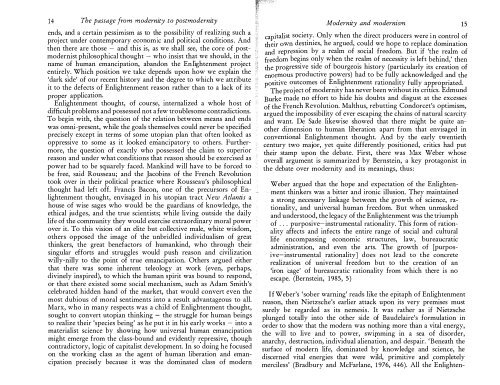The Condition of Postmodernity 13 - autonomous learning
The Condition of Postmodernity 13 - autonomous learning
The Condition of Postmodernity 13 - autonomous learning
Create successful ePaper yourself
Turn your PDF publications into a flip-book with our unique Google optimized e-Paper software.
14 <strong>The</strong> passage from modernity to postmodernityends, and a certain pessimism as to te possibi1t r <strong>of</strong> reali ng such aproject under contemporary e o lOmlc and polmcal condltlons. Andthen there are those - and thIs IS, as we shall see, the core <strong>of</strong> postmodernistphilosophical thought - who insist tha .t we should, in .thename <strong>of</strong> human emancipation, abandon the Enhghtenment rṛoJectentirely. Which position we take depends upon how .we explal the'dark side' <strong>of</strong> our recent history and the degree to whICh we attnbuteit to the defects <strong>of</strong> Enlightenment reason rather than to a lack <strong>of</strong> itsproper application.. .Enlightenment thought, <strong>of</strong> course, lllternahzed a whole o t <strong>of</strong>difficult problems and possessed not a few troublesome contradIctions.To begin with, the question <strong>of</strong> the relation between means and ndswas omni-present, while the goals themselves could never be speCIfiedprecisely except in terms <strong>of</strong> some utopian plan that <strong>of</strong>ten looked asoppressive to some as it looked emancipatory to o : hers. Furth rmore, the question <strong>of</strong> exactly who possessed the claIm to s penorreason and under what conditions that reason should be exercIsed aspower had to be squarely faced. Mankind will have to be forced .tobe free, said Rousseau; and the Jacobins <strong>of</strong> the French RevolutIontook over in their political practice where Rousseau's philosophicalthought had left <strong>of</strong>f. Francis Bacon, one <strong>of</strong> the precursors <strong>of</strong> Enlightenmentthought, envisaged in his utopian tract New Atlantis ahouse <strong>of</strong> wise sages who would be the guardians <strong>of</strong> knowledge, theethical judges, and the true scientists; while living outside the dailylife <strong>of</strong> the community they would exercise extraordinary moral powerover it. To this vision <strong>of</strong> an elite but collective male, white wisdom,others opposed the image <strong>of</strong> the unbridle individualism <strong>of</strong> gre tthinkers, the great benefactors <strong>of</strong> humankllld, who throụ? teIrsingular efforts and struggles would P uS? reason and CIVIhz tlOnwilly-nilly to the point <strong>of</strong> true emanCIpatiOn. Others argued eitherthat there was some inherent teleology at work (even, perhaps,divinely inspired), to which the human spirit was bound to resp nd,or that there existed some social mechanism, such as Adam Smith'scelebrated hidden hand <strong>of</strong> the market, that would convert even themost dubious <strong>of</strong> moral sentiments into a result advantageous to all.Marx, who in many respects was a child <strong>of</strong> Enlightenment thou ? ht,sought to convert utopian thinking - the struggle for human bemgsto realize their 'species being' as he put it in his early works - into amaterialist science by showing how universal human emancipationmight emerge from the class-bound and evidently reprẹssive, thoughcontradictory, logic <strong>of</strong> capitalist development. In so dOlllg he focusedon the working class as the agent <strong>of</strong> human liberation and emancipationprecisely because it was the dominated class <strong>of</strong> modernModernity and modernism 15capitalist society. Only when the direct producers were in control <strong>of</strong>their own destinies, he argued, could we hope to replace dominationand repression by a realm <strong>of</strong> social freedom. But if 'the realm <strong>of</strong>freedom begins only when the realm <strong>of</strong> necessity is left behind,' thenthe progressive side <strong>of</strong> bourgeois history (particularly its creation <strong>of</strong>enormous productive powers) had to be fully acknowledged and thepositive outcomes <strong>of</strong> E lightenment ration lity f lly a pp ropriated.<strong>The</strong> project <strong>of</strong> modermty has never been WIthout ItS cntIcs. EdmundBurke made no effort to hide his doubts and disgust at the excesses<strong>of</strong> the French Revolution. Malthus, rebutting Condorcet's optimism,argued the impossibility <strong>of</strong> ever escaping the chains <strong>of</strong> natural scarcityand want. De Sade likewise showed that there might be quite anotherdimension to human liberation apart from that envisaged inconventional Enlightenment thought. And by the early twentiethcentury two major, yet quite differently positioned, critics had puttheir stamp upon the debate. First, there was Max Weber whoseoverall argument is summarized by Bernstein, a key protagonist inthe debate over modernity and its meanings, thus:Weber argued that the hope and expectation <strong>of</strong> the Enlightenmentthinkers was a bitter and ironic illusion. <strong>The</strong>y maintaineda strong necessary linkage between the growth <strong>of</strong> science, rationality,and universal human freedom. But when unmaskedand understood, the legacy <strong>of</strong> the Enlightenment was the triumph<strong>of</strong> . .. purposive-instrumental rationality. This form <strong>of</strong> rationalityaffects and infects the entire range <strong>of</strong> social and cultur llife encompassing economic structures, law, bureaucraticadministration, and even the arts. <strong>The</strong> growth <strong>of</strong> [purposive-instrumentalrationality] does not lead to the concreterealization <strong>of</strong> universal freedom but to the creation <strong>of</strong> an'iron cage' <strong>of</strong> bureaucratic rationality from which there is noescape. (Bernstein, 1985, 5)If Weber's 'sober warning' reads like the epitaph <strong>of</strong> Enlightenmentreason, then Nietzsche's earlier attack upon its very premises mustsurely be regarded as its nemesis. It was rater as if Nie zsce.plunged totally into the other side <strong>of</strong> BaudelaIre's formulation morder to show that the modern was nothing more than a vital energy,the will to live and to power, swimming in a sea <strong>of</strong> disorder,anarchy, destruction, individual alienation, and despair. 'Be ? eath thesurface <strong>of</strong> modern life, dominated by knowledge and SCIence, hediscerned vital energies that were wild, primitive and completelymerciless' (Bradbury and McFarlane, 1976, 446). All the Enlighten-
















